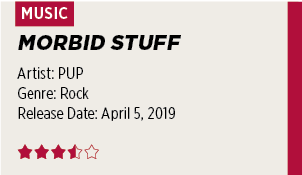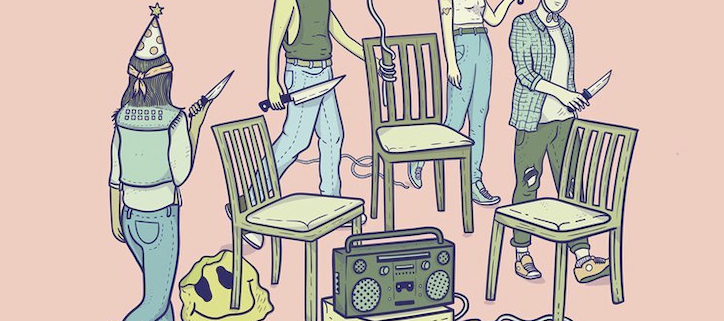REVIEW: PUP matures on the fickle ‘Morbid Stuff’


Rock band PUP’s newest album, “Morbid Stuff,” which released Friday, contains the band’s best work to date — and by a wide margin. In its first half, the album thrives off of sugary guitar riffs, punchy lyrics and the earwormy angst the band has built its reputation upon. Throughout the second half, the band puts the “punk” in “pop punk” and manages to focus its fury into a mesmerizingly mature sound fans have been anticipating for years. Separately, these halves would make two remarkable achievements in PUP’s discography. Together, however, they’re antithetical, and the jarring inconsistency stains what would otherwise be an immaculate record.
PUP has been on the rise for a while now, having occupied its own niche in both power pop and pop punk since the early 2010s. There’s a unique charm to PUP’s trainwreck persona, demonstrated by the group’s proudly emo, self-aware lyrics about refusing to grow up and dealing with press attention.
After a tour a few years back, lead singer Stefan Babcock was informed that he wouldn’t be able to perform lead vocals on songs again, due to the strain placed on his vocal cords from screaming in previous performances. However, the band moved forward after delivering its 2016 album “The Dream Is Over,” which features clever and candid songs tailored around Babcock’s condition.
However, PUP hasn’t been able to turn all heads due to its immaturity. The members suffer from the self-pitying angst that afflicts many in their field. Following multiple releases that feature the same themes of alcoholism, depression and a lack of self-control, the band’s sound becomes monotonous. Nobody can root for a protagonist that takes themselves too seriously and sees no personal growth.
The first half of “Morbid Stuff” seems to shave off this issue. From the beginning, the band seems to play more into its dry, dark humor, rather than striving for profound and poignant introspection. The titular first track “Morbid Stuff” proves this, opening with the lines “I was … sitting around and thinking all this morbid stuff like if anyone I’ve slept with is dead.” The candidness about such an intrusive, unwelcome and underdeveloped thought is satirical and sets the tone for a record filled with these pained, dry one-liners.
Lead single “Free At Last” features the group’s most self-aware (and arguably catchiest) hook to date: “Just ’cause you’re sad again, it doesn’t make you special at all!” Backed by heavy snares and rowdy baselines, the song makes for a cathartic headbanger. “Scorpion Hill” is another highlight. Cutting out all instrumentation except for one guitar, the song begins reminiscent of a nostalgic campfire song and slowly builds in harmonies until the melody picks up to swing-like pace with almost ska undertones.
As usual, PUP heavily plays up the theme of heartbreak on “Morbid Stuff.” This is best personified on “See You at Your Funeral,” which might be one of the year’s best break-up songs. F sharp and A minor are suitable chords for the band, and the chorus carries a fun somewhat staccato rhyme scheme that allows for lots of surprise added-on lines. Every time it seems like the lead singer has made peace, he falls right back to pettiness.
The second half is remarkable in a different way. The instrumentals get noticeably messier right around the seventh track. The vocals lose a level of mastery, making for an unkempt muffle reminiscent of garage rock or early heavy metal, and the general sonic landscape gets more cacophonous with heavy drums and ominous guitar solos, making it delightfully difficult to differentiate between what’s going on. More rock-leaning listeners will appreciate the later collection of songs on “Morbid Stuff,” particularly the aptly-named “Full Blown Meltdown.” The subject matter gets heavier, covering issues like poverty, mortality and the general state of world affairs.
Still, by demonstrating they can go the distance on certain songs, PUP invalidates its charming humor and lack of seriousness on others. The band delivers the track “Kids,” an early, syrupy sweet song about melancholy and love, with overly flowery prose and slam poetry-style cadence. The first half of the album, where the context is tongue-in-cheek, is forgivable. However, by the end, it appears as if PUP is begging listeners to take them seriously, causing these verses to become insufferable. Judging the record as a whole instead of the sum of its parts, “Morbid Stuff” is simply confusing.

